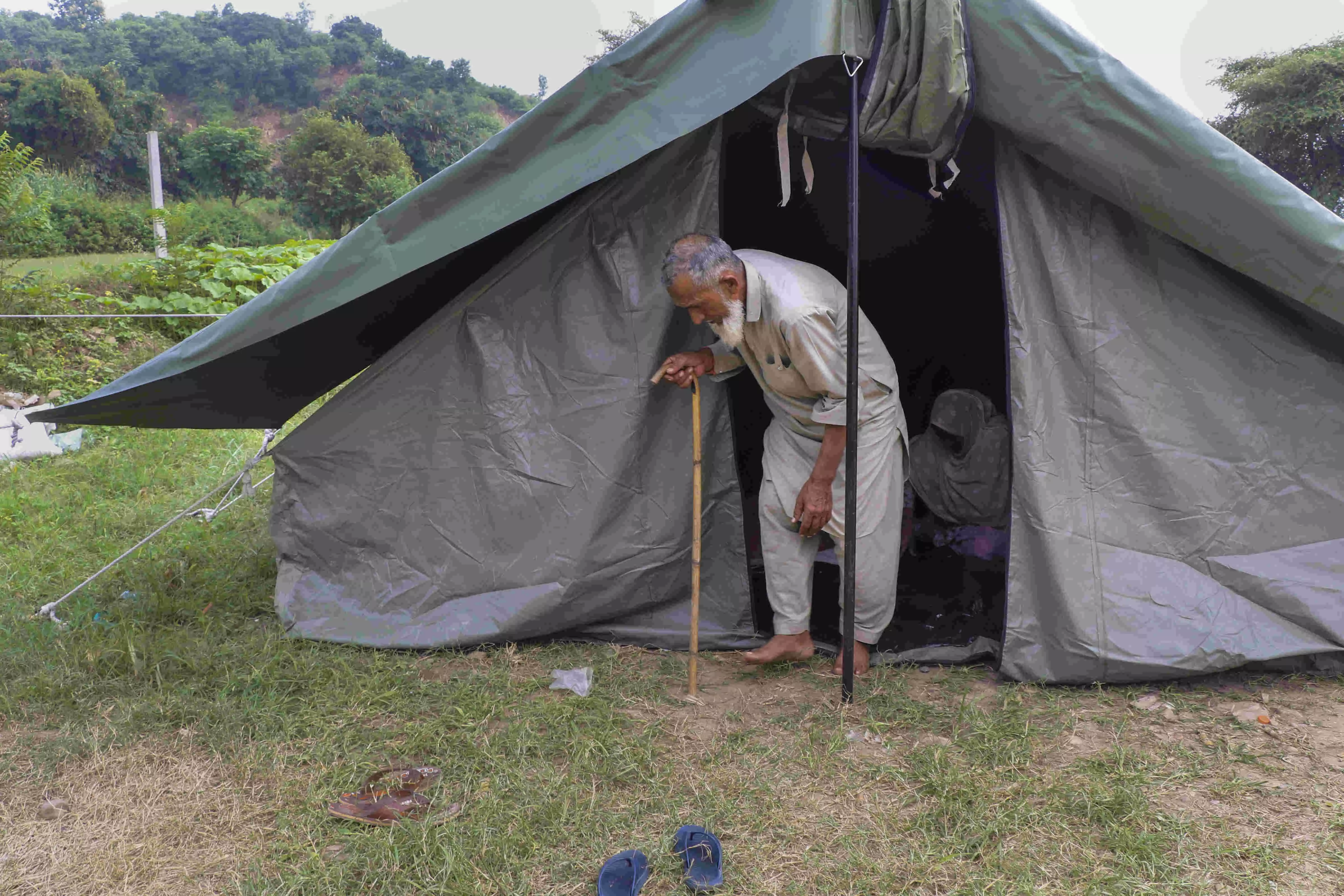Land subsidence crumbles hopes and dreams in Jammu, families with no homes plead for rehabilitation

Khari (Bantalab): Mohammad Javaid sits desolate under the fragile cover of a tent, unable to comprehend how he ended up in this situation. A little over a week ago, he was living with his family of six in his dream home.
But in a cruel turn of fate, his two-storied house in Khari village in Jammu and Kashmir, built only a year and a half ago, developed cracks due to land subsidence.
The house built from savings, made painstakingly through years of hard labour, has now collapsed, putting his family in a precarious place.
“For the past six to seven days, the land in our village has been sinking. It started with small cracks in our houses after the rains stopped around September 3, but now there are four to five-foot deep cracks in the earth,” Javaid tells PTI.
Eyes brimming with tears, he adds, “I spent lakhs of rupees building this house with every penny I saved. My house has gone. Now everything is completely destroyed. We sleep in our farm land under tarpaulins, covering our goods and family when the rains come.”
Javaid says their survival solely depends on the support of the government and his fellow villagers. “The administration has given us tents, but it’s no substitute for a home. Nearly 20 to 25 houses here are completely damaged.”
Across the Jammu region, land subsidence has been reported at 19 places in Ramban, Kishtwar, Poonch, Reasi, and Kathua districts. This follows heavy rains and flash floods at the end of August that displaced over 2,500 to 3,000 people in J-K.
Those who lost their homes and livelihoods now appeal to the government for urgent relief and permanent rehabilitation as they continue to live under the constant threat of sinking ground and further tragedy.
Khari lies on mountainous terrain, and is called the green engine of Jammu due to its lush green cover. The village is 15 km from Jammu, the city of temples.
Now Khari wears the look of a place devastated by an earthquake, with some houses sunk into the land, collapsed roofs and walls. Across a vast patch of land, residents have set up tents where subsidence-hit families stay, along with their household goods and cattle.
With no power and water supply, and road connectivity disrupted due to the recent floods, several families spend long hours sitting on beds in the open under the shade of trees.
Gulam Mohammad (69) and his seven family members say they fear that the ground could give way at any moment.
“My house collapsed and sank into the earth after the surrounding land submerged five to six feet deep on September 5. We barely managed to bring out our household goods and family,” he says.
“Every day the land sinks more. The tents and rations we received from the administration help, but living here is too risky. We want the government to relocate us to safer places," he says.
Mehram Bibi recalls how her house sank within minutes on September 6. "All our household goods were buried along with the house. We have nothing left, but thankfully, we managed to save our lives,” she says.
Bibi, whose two sons and their families lost their home, says there is no electricity or water supply, and the roads have been damaged. "We survive on rations from the Army and some kind people who offer food. But how long can we endure this?” she asked, her voice trembling.
“Where will we go as the rains are continuing and the land keeps sinking? We demand immediate rehabilitation,” she says.
Muskaan, 35, says the construction of her house was nearing completion when the land around the house collapsed. "We were about to move in."
"I have sent my family to a relative’s home. We have lost everything. Now we are out on the streets," she wept, holding her child close.
Following a week of incessant rainfall and devastating floods, concerns over land subsidence, especially in the flood-affected regions, have aggravated the troubles of the people in Jammu.
The ground has been sinking for days in Khari and Kanger panchayats of Bantalab area, Lower and Upper Bermini, Guraa, Chaata, Undue Sarari in the Sidhra-Bajalta belt on the outskirts of Jammu city, leading to deep cracks in at least 100 houses.
All affected families have been shifted to temporary tents. Officials suspect that excessive water saturation caused by torrential rains led to the subsidence in parts that are on hilly terrain.
Experts are expected to inspect the site soon to assess the situation further.
Over 50 houses in the mountainous Bermini area suffered damage due to land subsidence since heavy rains began on August 30.
“Most houses either have cracks, are partially crumbling, or are sinking entirely into the earth. Security personnel have been deployed to prevent villagers from re-entering their unsafe homes, which are spread over 800 to 900 kanals of land," an official says.
Razvi Bibi, whose house was destroyed, says, “With great difficulty, I managed to salvage a few household items. We have lost everything. We live in the open with our cattle now.”
Maqbool, forced to abandon his home along with many families in Lower Bermini hamlet, says, “All houses either have cracks or are damaged and sinking. Over 50 homes within just 1 km have collapsed since August 31.”
Abdullah Hamid’s cattle shed also sank, burying all his cattle. “We managed to escape with our lives, but now we are living in a school building with no place for our cattle. We urgently need rehabilitation,” he said.



